[the_ad_group id=”632″]
BOCA RATON – Watching Trent Wessel command the practice field, it’s easy to understand why Lane Kiffin thinks he’s mentoring a future coach.
Fourth – at best – out of five quarterbacks on the depth chart of Owls currently participating in fall camp, Wessel is nonetheless intricately involved in practice. He’ll signal plays. He’ll explain reads. He’ll teach the offense.
And every few turns, No. 19 correctly reads the defense and throws strikes to open receivers.
Wessel does want to coach. Eventually. But August isn’t the time to discuss that.
He walked into an interview days before the start of camp and began speaking with the bravado and charisma of a starting college quarterback. The football world is open to him.
Wessel’s happy to discuss his life plan, which almost certainly will involve coaching. He’d prefer, however, to converse about his role as a quarterback.
“I will always be looking at the right spots,” said Wessel with a confidence devoid of cockiness. “I might not be physically the fastest, the strongest, but my arm strength has gotten a lot better. I know where to put the ball. And I know how to break down coverages.”
Wessel always mastered the mental part of the game. When he didn’t quite have the physical tools to garner an FBS scholarship offer after two years starting at state powerhouse Tampa-Jesuit, he elected to attend prep school at Fork Union Military Academy.
Winning seven of his eight starts there didn’t bring a scholarship offer either, but a young offensive coordinator who tried to lure Wessel to Samford the year prior offered Wessel a walk-on spot at that coach’s new school. So Wessel followed coach Travis Tricket to FAU.
Wessel didn’t see the field in that first year, serving as the third-string quarterback for a 2016 season that ended with the firing of FAU coach Charlie Partridge. Shortly after FAU hired Lane Kiffin, and Trickett left for Georgia St.
Uncertain whether he wanted to play for Kiffin and new offensive coordinator Kendal Briles, Wessel did not attend fall camp in 2017, but did rejoin the Owls once classes began in late August.
Wessel called learning the Owls’ new offense “a whirlwind,” because it was more like learning two new offenses – blending the speed that Briles valued with the precision Kiffin demanded.
Before long Briles approached Wessel with a proposal that would help solve a crowded quarterback battle: would he like to be a student coach?
“Yes, coaching is what I wanted to do, but I didn’t really expect to be removed from the roster, but it is what it is,” Wessel said. “I just wanted to do anything that I could to help the team win.”
THE KIFFIN PATH
More than most coaches, Kiffin understands the kind of double life Wessel leads.
A former quarterback himself, Kiffin enrolled at Fresno St. in the late 1990s with plans on becoming an NFL quarterback. The Bulldogs actually produced two NFL QBs during Kiffin’s time there, Billy Volek and David Carr. Kiffin soon realized he wouldn’t be the third.
“That’s one of the best things ever because I got started in coaching and you just got ahead of the game, while your buddies were all still playing,” said Kiffin, who in 2007, at age 31, became the Oakland Raiders head coach – at the time youngest coach in NFL history. “It’s six years, seven years down the road, now they are trying to get their first GA job and I’ve been coaching for six or seven years at the time.”
Like Kiffin, whose father Monte enjoyed a long NFL coaching career, Wessel is also the son of a coach. His father, Joe, played at Florida St., then served as an assistant at LSU and Notre Dame before jumping to the NFL’s Cincinnati Bengals.
Both Kiffin and Wessel grew up around football. Both grew up thinking like coaches.
“I think Trent’s really unusual because his football IQ and maturity is a lot further than his age,” Kiffin said. “This is not a kid that just sees himself as a coach and he’s only out there to learn so that he can coach someday. He’s very confident in his abilities.”
Kiffin recognizes the potential parallelim between his career and Wessel’s trajectory.
“We have a very similar story because that’s what happened to him at Fresno St.,” Wessel said. “I kind of think that he knows what I’m going through, too. I’ve definitely appreciated working for him and being his player and being his coach at the same time.”
SIGNAL BOOSTER
As a player-turned-coach that first year under Kiffin, Wessel didn’t exactly fade into the background.
Rather than run the scout team, a common task for QBs deep on the depth chart but a duty Wessel’s never been asked to perform, Wessel attended and provided input during quarterback meetings, stood on the sidelines during practice with the first and second string units, and became one of the play signalers on game day – relaying the offensive coordinator’s play call to the quarterback on the field via hand signals.
Except for the not-actually-playing part of the year, that 2017 season became a dream season for Wessel and the Owls.
“I was on the big field,” Wessel said. “I was involved.”
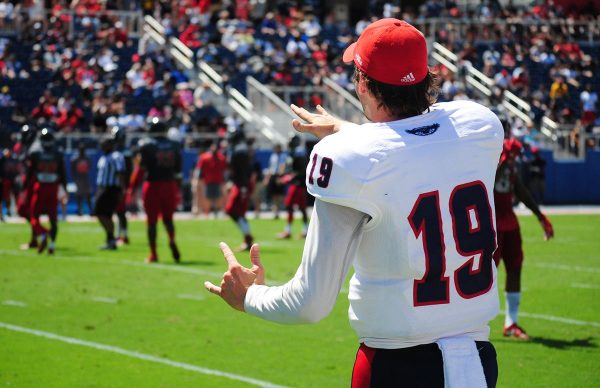
FAU WB Trent Wessel signals a play call during the Owls Spring Game. (OwlAccess.com photo)
With a season as a student coach to list on his resume, Wessel entered 2018’s fall camp as the third quarterback on the Owls’ depth chart, behind Chris Robison and De’Andre Johnson.
That changed when Kiffin, uncomfortable with the quarterback play early in camp, brought SMU transfer Rafe Peavey to Boca Raton.
“Year 2 it happened again, unbeknownst to me,” Wessel said. “One day I was out in pads and then three days later I was out in a long sleeve shirt and shorts with a hat on.”
Peavey’s addition removed all chance of playing time for Wessel.
“When we proposed this to him he took it hard, but he did what was best for the team because we had some veteran quarterbacks who were obviously going to travel,” Kiffin said. “There wasn’t going to be room for him.”
Being a student coach has some advantages. Wessel would once again signal the plays. In fact, Kiffin and first-year offensive coordinator Charlie Weis allowed Wessel the freedom to work with the other quarterbacks to create the signals they’d use in games.
“Whenever the install goes in you have to establish, Hey, this is what I’m going to do,” Wessel said. “This is what you are going to see from my end, so make sure that you understand it on the field because I’m only going to do it a couple times. We go fast, so I’ve got to signal fast. This is where I coach the players.”
Wessel’s football acumen – essentially his coaching background – produces the ability to quickly process and disseminate critical information. Often Wessel begins signaling the next play from the sideline – arms waving, hands waggling, fingers wiggling – before the whistle blows the current play dead.
There’s an art to being a good signaler.
“There definitely is,” Kiffin said. “The ability to transfer the information really quick, remember the signals, but also see the game so you can see who’s seeing the signal, who doesn’t, whether I have to repeat it. I can tell by the body language of that receiver over there, even though he’s standing like he’s ready to go, he really doesn’t have it. I think there’s a lot to it.”
PUTTING ON THE PADS
Wessel’s life is more hectic than most people his age – or most any other age for that matter. He’s a full-time business major, a full-time football player/coach and, because he isn’t on scholarship, he holds down a part-time job at a local country club.
For the time being, at least, he’s wearing a helmet and jersey rather than a hat and long sleeves during the Owls’ muggy morning practices.
With Robison suspended for the spring, Wessel assumed a larger role on the field and more than held his own. He ended spring third on the depth chart, behind Nick Tronti and Justin Agner but ahead of redshirt-freshman scholarship quarterback Cordel Littlejohn.
“He had a really good spring,” Kiffin said. “He commanded our offense well and made a lot of plays.”
Standing 6-foot-2 and weighing close to 200 pounds, Wessel’s physical skills don’t scream elite college quarterback. But neither did those of Jason Driskel, the heady QB who stabilized the Owls in Kiffin’s first season by making good reads and limiting mistakes.
“If you want to talk to someone who’s really a student of the game, it’s Trent Wessel,” Tronti said. “When he’s on the field he knows where to go with the ball. I think he could definitely be an unbelievable coach one day.”
Less than a week into fall camp, the odds of Wessel making a Driskel-esque breakout appear long. With Robison reinstated and Kiffin overseeing a three-way battle between Robison, Tronti and Agner for the starting spot, Wessel often finds himself on the second field with the younger players when the Owls go to their full-team scrimmage periods. He’s throwing bombs while mentoring true freshman Javion Posey – the Owls future at the quarterback position.
Depth charts can change rapidly this time of year, but unless something radical happens – a serious injury, a transfer, etc. – Kiffin and Wessel may soon be forced into another difficult discussion.
Rules covering travel for non-conference games are different from the C-USA mandates. The Owls should be able to carry four quarterbacks on the charter flight to the Aug. 31 season-opener at Ohio St. and to the Sept. 14 contest at Ball St.
Once C-USA play begins and the limitations kick in, however, the Owls will restrict their QB travel party to three arms.
For now, though, Wessel is preparing to execute plays in a game rather than signal them – even if that’s only for a few downs. What would actual game action mean to Wessel?
“It would mean a lot,” Wessel said. “I’ve been, obviously, just emotionally, been though so much just over the last three-and-a-half years. It would mean a lot to me to know that I fulfilled something that my dad worked so hard to get to when he was at Florida State and something that I worked so hard for my entire time here.”
But even if he doesn’t see the field, Wessel will still be building his coaching library, storing on the shelves lessons most college football players never learn.
“I’ve learned that there are right things to go about calling plays and implementing, and how important personnel is, and just all the stuff that coaches do on a daily basis that players never see,” Wessel said. “I’ve kind of gained a perspective that I’ve never had before and something that my dad could never give me because I hadn’t experienced it. It was crucial for me to go though all of that because I see the game completely differently.”
No matter how the 2019 season unfolds Wessel, the part-time player, figures to eventually make a smooth transition to Wessel, the full-time coach.
“I don’t think anybody’s had as unique an experience as I have,” Wessel said.

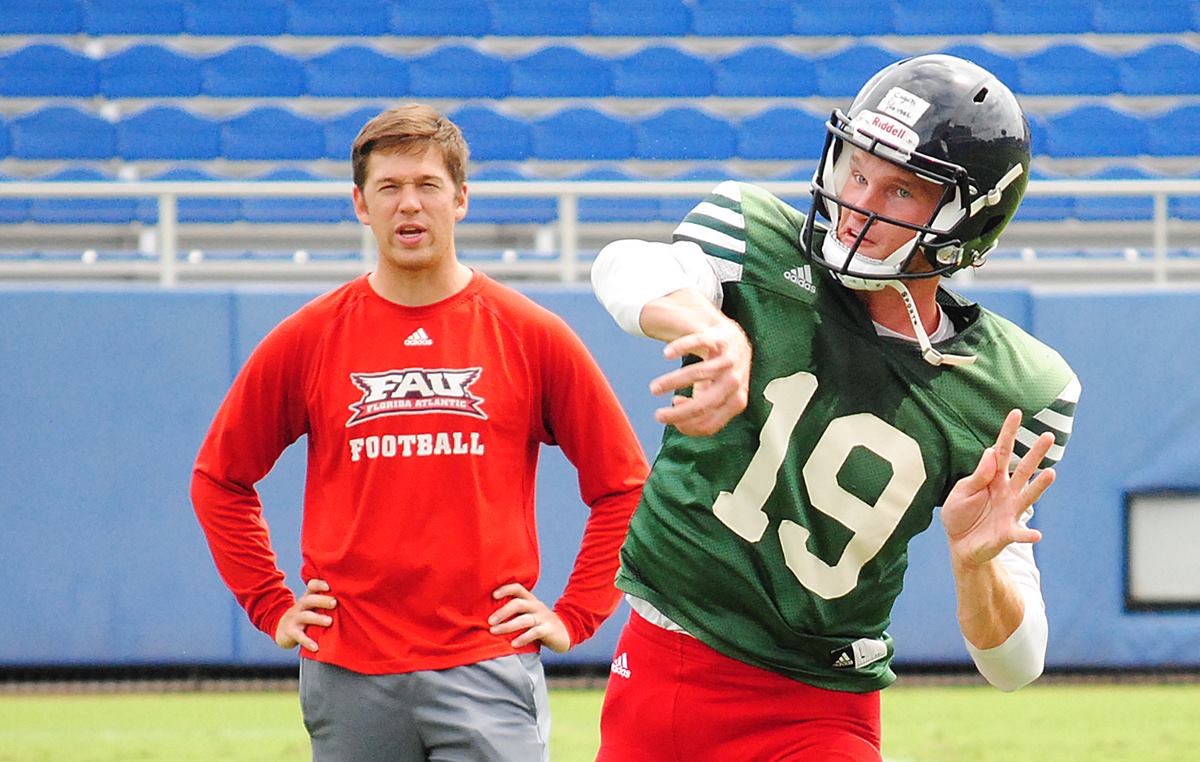
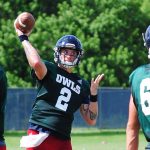
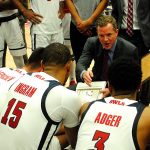
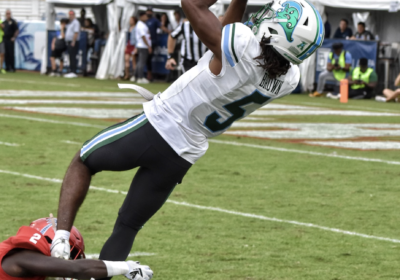

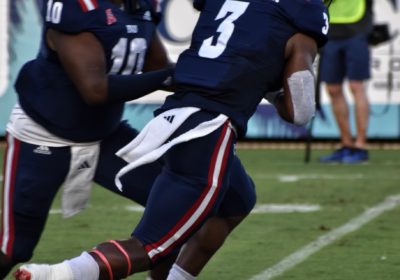
Recent Comments